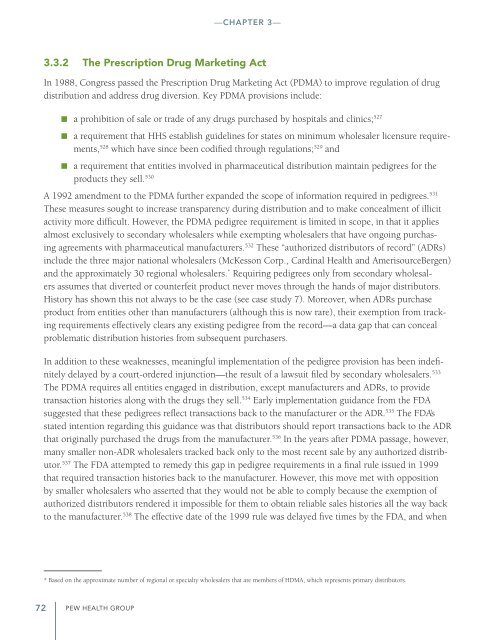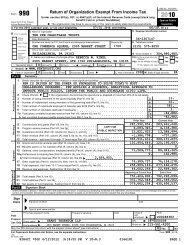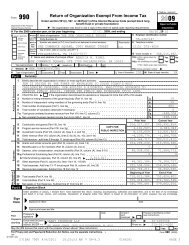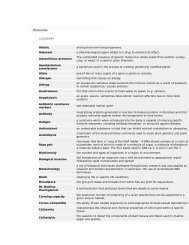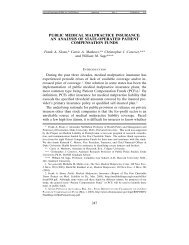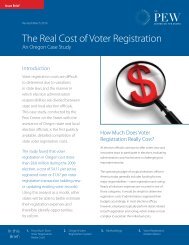After Heparin: - The Pew Charitable Trusts
After Heparin: - The Pew Charitable Trusts
After Heparin: - The Pew Charitable Trusts
You also want an ePaper? Increase the reach of your titles
YUMPU automatically turns print PDFs into web optimized ePapers that Google loves.
—Chapter 3—<br />
3.3.2 <strong>The</strong> Prescription Drug Marketing Act<br />
In 1988, Congress passed the Prescription Drug Marketing Act (PDMA) to improve regulation of drug<br />
distribution and address drug diversion. Key PDMA provisions include:<br />
■ a prohibition of sale or trade of any drugs purchased by hospitals and clinics; 527<br />
■ a requirement that HHS establish guidelines for states on minimum wholesaler licensure requirements,<br />
528 which have since been codified through regulations; 529 and<br />
■ a requirement that entities involved in pharmaceutical distribution maintain pedigrees for the<br />
products they sell. 530<br />
A 1992 amendment to the PDMA further expanded the scope of information required in pedigrees. 531<br />
<strong>The</strong>se measures sought to increase transparency during distribution and to make concealment of illicit<br />
activity more difficult. However, the PDMA pedigree requirement is limited in scope, in that it applies<br />
almost exclusively to secondary wholesalers while exempting wholesalers that have ongoing purchasing<br />
agreements with pharmaceutical manufacturers. 532 <strong>The</strong>se “authorized distributors of record” (ADRs)<br />
include the three major national wholesalers (McKesson Corp., Cardinal Health and AmerisourceBergen)<br />
and the approximately 30 regional wholesalers. * Requiring pedigrees only from secondary wholesalers<br />
assumes that diverted or counterfeit product never moves through the hands of major distributors.<br />
History has shown this not always to be the case (see case study 7). Moreover, when ADRs purchase<br />
product from entities other than manufacturers (although this is now rare), their exemption from tracking<br />
requirements effectively clears any existing pedigree from the record—a data gap that can conceal<br />
problematic distribution histories from subsequent purchasers.<br />
In addition to these weaknesses, meaningful implementation of the pedigree provision has been indefinitely<br />
delayed by a court-ordered injunction—the result of a lawsuit filed by secondary wholesalers. 533<br />
<strong>The</strong> PDMA requires all entities engaged in distribution, except manufacturers and ADRs, to provide<br />
transaction histories along with the drugs they sell. 534 Early implementation guidance from the FDA<br />
suggested that these pedigrees reflect transactions back to the manufacturer or the ADR. 535 <strong>The</strong> FDA’s<br />
stated intention regarding this guidance was that distributors should report transactions back to the ADR<br />
that originally purchased the drugs from the manufacturer. 536 In the years after PDMA passage, however,<br />
many smaller non-ADR wholesalers tracked back only to the most recent sale by any authorized distributor.<br />
537 <strong>The</strong> FDA attempted to remedy this gap in pedigree requirements in a final rule issued in 1999<br />
that required transaction histories back to the manufacturer. However, this move met with opposition<br />
by smaller wholesalers who asserted that they would not be able to comply because the exemption of<br />
authorized distributors rendered it impossible for them to obtain reliable sales histories all the way back<br />
to the manufacturer. 538 <strong>The</strong> effective date of the 1999 rule was delayed five times by the FDA, and when<br />
* Based on the approximate number of regional or specialty wholesalers that are members of HDMA, which represents primary distributors.<br />
72<br />
<strong>Pew</strong> Health Group


